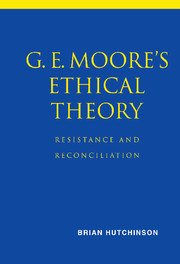Book contents
- Frontmatter
- Contents
- Introduction: Irony, Naïveté, and Moore
- 1 Simplicity, Indefinability, Nonnaturalness
- 2 Good's Nonnaturalness
- 3 The Paradox of Ethics and Its Resolution
- 4 The Status of Ethics: Dimming the Future and Brightening the Past
- 5 The Origin of the Awareness of Good and the Theory of Common Sense
- 6 Moore's Argument Against Egoism
- 7 The Diagnosis of Egoism and the Consequences of Its Rejection
- 8 Moore's Practical and Political Philosophy
- 9 Moore's Cosmic Conservatism
- 10 Cosmic Conservatism II
- Bibliography
- Index
10 - Cosmic Conservatism II
Published online by Cambridge University Press: 28 July 2009
- Frontmatter
- Contents
- Introduction: Irony, Naïveté, and Moore
- 1 Simplicity, Indefinability, Nonnaturalness
- 2 Good's Nonnaturalness
- 3 The Paradox of Ethics and Its Resolution
- 4 The Status of Ethics: Dimming the Future and Brightening the Past
- 5 The Origin of the Awareness of Good and the Theory of Common Sense
- 6 Moore's Argument Against Egoism
- 7 The Diagnosis of Egoism and the Consequences of Its Rejection
- 8 Moore's Practical and Political Philosophy
- 9 Moore's Cosmic Conservatism
- 10 Cosmic Conservatism II
- Bibliography
- Index
Summary
Art between Politics and Religion
It is the most important feature of Moore's account of the other of the world's great goods, aesthetic appreciation, that by it one achieves a level of detachment from the hurly-burly of the ordinary world that is not unreasonably considered “other-worldly.” Moore's casuistry thus makes room for the kind of sensibility the religious believer rightly finds to be valuable but which, because of his thought that it requires the complete abandonment of the ordinary world, he cannot successfully articulate. But many will suspect that Moore must fail in his attempt to cultivate a sense of detachment that yet remains tethered to this world. By turning away from the ugly facts of politics and power, Moore makes his philosophy escapist and thereby seeks to avoid the burdens of responsibility that a transformative understanding of the world places on one. Religion and politics thus provide the poles between which to place Moore's account of aesthetic appreciation. His claim at the beginning of “The Ideal” that religious and political exigencies are not to be allowed to intrude on the explication of the world's great goods provides us with the best way of understanding how he must proceed if his account of aesthetic appreciation is to be consistent with his cosmic conservatism: He must offer the possibility of an aesthetic sensibility that is neither escapist nor transformative.
- Type
- Chapter
- Information
- G. E. Moore's Ethical TheoryResistance and Reconciliation, pp. 190 - 210Publisher: Cambridge University PressPrint publication year: 2001



